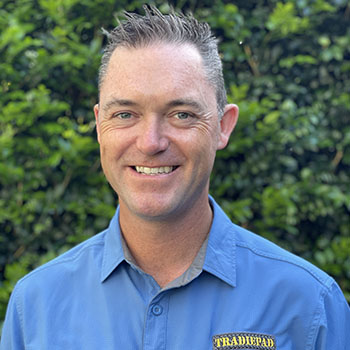It’s the new financial year and the perfect time to review your strengths and weaknesses from the previous year and set a plan in place to improve your business moving forward.
In this Tech Talk we are joined by Business Coach Matthew Jones from Cube Performance who has helped numerous tradies focus on their goals and carve a path to success.
Watch the full replay of this tech talk below.
Planning for Success [0:01:24s]
July is exciting because it’s the start of a new financial year for businesses, a great time to learn from the previous year’s mistakes or wins and create a plan for success for the new year.
Matthew Jones has had experience as a plumber, software developer, consultant, football team coach, author, podcaster, Olympic commentator and tradie business coach. He shares some tips with us on how tradies can create a plan for success.
Importance of Coaching and Education [0:9:00s]
Matt believes that having a coach or someone guiding you to fast track your progress is the best way to achieve success in your tradie business, similar to how athletes have coaches to guide them.
As a plumber in the 1990s he had no assistance or information back then and knew coaching and education was something many tradies would benefit from to become good business owners.
Business Performance Mindset [0:10:09s]
Tradies often become business owners because they are good at their trade, but they may not have the right mindset for running a successful business. A tradie mindset is focused on working hard and doing more work to get ahead financially, without paying attention to planning or financial management.
Matt struggled with this “tradie mindset” when he was a plumber and realised that he needed to shift to a “business performance mindset” in order to succeed financially.
A business performance mindset recognises that being a business owner requires a different set of skills and priorities than being a tradesperson. Profit is the key metric for success, rather than turnover or hours worked.
Running the plumbing business I knew I needed to get assistance, I knew I needed to get educated. It's a bit like an athlete, everyone at the Olympic Games has got a coach or someone guiding them to sort of fast track them.
Matthew Jones from Cube Performance
Planning for Profit in your tradie business [0:12:00s]
Having a 12-month plan is essential for operating with a business performance mindset. This plan should include specific goals for your profitability. Thinking about your business like a sports team can help you set clear goals and track progress over time.
Regular reviews are important for identifying what’s working well and what needs improvement. Just like after every game, you should review your performance as a team (or as an individual).
Tracking Business Performance [0:14:48s]
Business performance should be about planning and making educated decisions. Many businesses fail within five years due to lack of planning and tracking their financial performance. Out of 100 tradies who start a business, only 20 survive after five years. Out of those 20, only two thrive beyond ten years.
Most people rely on gut feelings to determine if they are making money across the board. Relying solely on gut feelings is not enough and is equivalent to gambling with one’s business, potential and family lifestyle.
Too many business owners do not know their gross profit, percentage, operating profit or average hourly rates. This lack of knowledge is unacceptable in today’s world where tools are available to track these metrics. It is crucial for businesses to extract data from their accounting system or job management system and measure it against a plan.
Measuring business performance is essential for success. Relying solely on gut feelings can lead to failure. Businesses need to track their financial metrics using available tools and make educated decisions based on data.
Planning and Accountability [0:19:44s]
Having a plan is crucial for accountability and making good decisions but many of us struggle with knowing where to start.
Matt suggests starting with breaking down key types of work that you currently do and how you plan to build and grow in the next 12 months. You can extract actual data from your accounting software from the last 12 months to help you plan or a simple spreadsheet can be used as a starting point. Remember this plan can change so your business can pivot when necessary while still having guard rails in place.
You're not running a business for a wage, you're running a business for profit to get ultimately rewarded for that investment in blood, sweat and tears.
Matthew Jones from Cube Performance
Tracking Income [0:22:11s]
It’s important to break down income into specific categories such as construction or maintenance rather than just having one general category. Think about how many monthly invoices or jobs are done on average and what the average monthly turnover for each type of work is. If you only have one account code for all different types of work may find it challenging to determine their average monthly turnover.
Seperating Costs for Better Metrics [024:21s]
Many businesses have only one material account, which makes it difficult to understand gross profit per work type. It is important to separate construction materials from maintenance materials to get a better understanding of gross profit per work type. Breaking out costs in accounting packages or job management systems may require additional work but is critical for putting together accurate plans. When looking at your financials, never include GST in income or expenses.
Defining different types of work helps define customers and go-to-market strategies. Different types of customers require different approaches, such as relationship building for business-to-business customers and SEO and a good website for residential maintenance customers.
Segmenting your business [0:29:06s]
Segmenting your business by work type helps you position yourself better and attract more customers. Splitting maintenance work into residential and commercial segments can help you identify clear differentiators in your business. You can further segment your business based on specific customer needs, such as emergency maintenance or service work.
Breaking down construction work into residential and commercial segments can help you identify which type of customer adds more value to your organisation. Identifying revenue codes is easy, but it’s important to factor in capacity and hourly rates when investing in delivering that work.
When you open up shop and you get a business card and you start running a business you're no longer a tradie, you're a business owner first and that's a big shift.
Matthew Jones from Cube Performance
Pay yourself First [0:31:19s]
Many business owners fail to pay themselves first, which leads to cash flow problems. If you can’t pull a wage out of your business from the get-go, then you shouldn’t be in business.
Gross Pay for Employees [0:33:11s]
Gross pay includes taxes paid by the company on behalf of its employees. It’s important to calculate gross pay accurately to avoid financial discrepancies.
Importance of Accurate Financial Planning [0:34:25s]
Accurate financial planning helps business owners identify whether their businesses are worth running. It also helps them make informed decisions about investments and expenses.
Many business owners fail to plan for direct costs that correlate with revenue codes. They also fail to factor in indirect costs such as rent and utilities when calculating profitability. Accurate financial planning is crucial for any business owner who wants to succeed in their industry.
It's every business owner's responsibility to know the numbers so they're working with their bookkeeper, they're working with their accountants, they're a team.
Matthew Jones from Cube Performance
Understanding Your Business Costs [0:33:50s]
Overhead costs are necessary to run a business. It is crucial to know line by line what it’s costing you to run your business. Many business owners fail to have enough clarity and breakdown of their expenses. They often lump everything together into general accounts or miscellaneous accounts. It is important to factor understand all additional costs associated with running your business such as annual leave loading, superannuation, long service leave, and workers’ compensation.
The ultimate goal for any business owner should be to make themselves redundant over time so the business is running without them. However, in the beginning stages of a business, it may be necessary for the owner to still be on the tools and delivering work while putting systems in place and training employees.
Budgeting for Tradie Businesses [0:38:19s]
Business owners often underestimate how much it actually costs them to run their business. Creating a clear budget helps structure office costs, including rent, phones, advertising, and professional services. It’s important to factor in operating costs such as fuel and maintenance for vehicles. Going through expenses line by line can help identify areas where money is being spent unnecessarily.
Professional services such as accounting, legal advice, bookkeeping, coaching, technology implementation should be factored into the budget. Investing in digital tools such as TradiePad should be seen as an investment rather than an expense.
Having the Right Tools [0:42:56s]
It’s important to have the right tools structured correctly to collect data in a way that makes it easy to monitor. Grouping transactions together and making it easy to monitor is key.
People often don’t want to invest in assistance to get software tool set up right, but this can lead to frustration and wasted money. It’s pointless having nice shiny tools if you don’t set them up correctly.
The majority of business owners, especially the ones that are not around anymore or not making good money, is that they don't actually know line by line what it's costing them in terms of to run their business
Matthew Jones from Cube Performance
Achieving Your Business Goals [0:44:04s]
Setting clear goals for the next 12 months is important for ensuring decisions are not made off-the-cuff. Understanding cost of sale and power percentages is important when budgeting for delivering work.
Labour and Overheads [0:47:41s]
Matt talks us through labor and overhead costs in construction and maintenance businesses. A dedicated maintenance category should be added to the chart of accounts for payroll purposes. Materials, subcontractors, equipment hire fees, etc., should be categorised as overheads.
The cost of sale plus gross profit will always equal 100%. For every $100 earned in construction, $65 is kept as gross profit. For every $100 earned in maintenance, $73 is kept as gross profit.
The overall gross profit margin for a business is calculated by dividing the total gross profit by the total revenue. i.e. For every $100 earned collectively, $70 is kept as gross profit.
Understanding Gross Profit [0:50:08s]
Direct costs are often mistakenly categorised as overhead expenses. This leads to incorrect calculations of gross profits. It’s important to set up expense codes correctly so that direct costs are not mistaken for overhead expenses or vice versa.
Knowing those percentages and making a slight increase to the turnover but not changing the the expenses is going to have a direct impact on the bottom line
Matthew Jones from Cube Performance
Income Verses Expenses [0:52:41s]
Matt explains that it is crucial to maintain a certain percentage of income relative to expenses, even if the income target is not met. Failure to track sales performance can lead to complacency and poor business decisions. The minimum operating profit before tax target should be 15% for all clients.
Using Data to Increase Profits [0:54:00s]
Businesses can use numbers and key performance indicators (KPIs) to increase profits. Maintaining gross profit margins is crucial for increasing profits and increasing turnover while maintaining gross profit margins can lead to increased profits.
Businesses should monitor KPIs every month in order to increase profits. Failure to monitor KPIs can result in decreased efficiency, poor pricing strategies, and decreased gross profit margins.
Monitoring numbers on a monthly basis can help identify trends and make necessary adjustments to improve efficiency. Operating profit number is relative to capacity turnover and efficiency. Increasing turnover without changing expenses can have a direct impact on the bottom line.
Measuring percentages is crucial for understanding your business efficiency. When direct labor goes up, it’s important to monitor jobs and talk to the team to identify inefficiencies. Process efficiency can be affected by things like ordering, scheduling, managing purchase orders, inventory, and team management. Monitoring percentages on a monthly basis helps identify trends in business efficiency.
Understanding business numbers is everyone’s responsibility as a business owner. The ability to put numbers together is key in improving business efficiency. By dropping your margins from 70% to 60% you will increase your break-even point and require more work to get done just to break even.
Budgeting and Forecasting [1:02:33s]
To create a budget, divide annual numbers into monthly figures. Plan for seasonal changes in business activity when creating a budget. Use forecasting to plan capacity and spending based on expected profits.
Track expenses by looking at potential months of high spending, such as when building a website or paying for maintenance work. Use experience and advice from trusted advisors like your bookkeeper or accountant to predict slow periods in business activity.
It’s important to ask the right questions when meeting with advisors to get the best advice, having your numbers in order can help in asking better questions. Discuss plans for achieving operating profit and minimising your tax liability and put structures in place to protect your personal assets as your business grows.
MEET THE SPEAKERS

Matthew Jones - Cube Performance
Tradie, business owner, coach, and author with over 25 years experience owning, operating and managing businesses. The CUBE business intelligence software platform demystifies the numbers so that business owners earn more, work less and create a great life for themselves and their family.



